英语听力文字材料及参考答案
- 格式:doc
- 大小:41.00 KB
- 文档页数:4
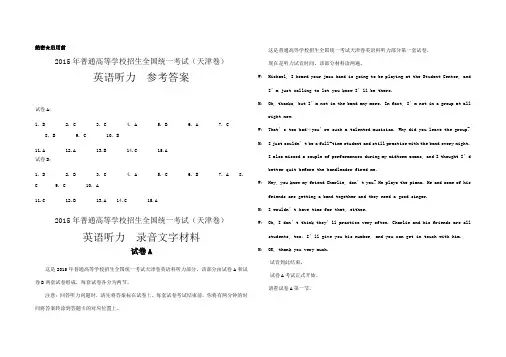
绝密★启用前2015年普通高等学校招生全国统一考试(天津卷)英语听力参考答案试卷A:1. B2. C3. C4. A5. B6. A7. C8. B 9. C 10. B11.A 12.A 13.B 14.C 15.A试卷B:1. B2. B3. C4. A5. C6. B7. A8.C 9. C 10. A11.C 12.B 13.A 14.C 15.A2015年普通高等学校招生全国统一考试(天津卷)英语听力录音文字材料试卷A这是2015年普通高等学校招生全国统一考试天津卷英语科听力部分。
该部分由试卷A和试卷B两套试卷组成,每套试卷各分为两节。
注意:回答听力问题时,请先将答案标在试卷上。
每套试卷考试结束前,你将有两分钟的时间将答案转涂到答题卡的对应位置上。
这是普通高等学校招生全国统一考试天津卷英语科听力部分第一套试卷。
现在是听力试音时间。
该部分材料读两遍。
W: Michael, I heard your jazz band is going to be playing at the Student Center, and I’m just calling to let you know I’ll be there.M:Oh, thanks, but I’m not in the band any more. In fact, I’m not in a group at all right now.W:That’s too bad-you’re such a talented musician. Why did you leave the group? M: I just cou ldn’t be a full-time student and still practice with the band every night.I also missed a couple of performances during my midterm exams, and I thought I’dbetter quit before the bandleader fired me.W:Hey, you know my friend Charlie, don’t you? He plays the piano. He and some of his friends are getting a band together and they need a good singer.M:I wouldn’t have time for that, either.W:Oh, I don’t think they’ll practice very often. Charlie and his friends are all students, too. I’ll give you his num ber, and you can get in touch with him.M: OK, thank you very much.试音到此结束。
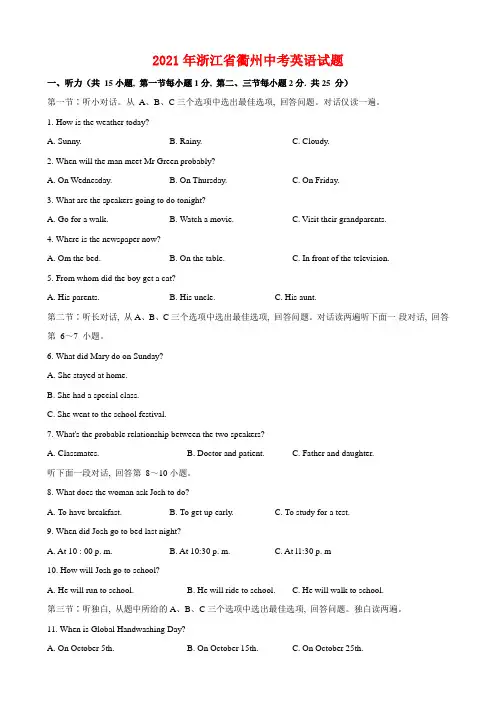
2021年浙江省衢州中考英语试题一、听力(共15小题, 第一节每小题1分, 第二、三节每小题2分. 共25 分)第一节∶听小对话。
从A、B、C三个选项中选出最佳选项, 回答问题。
对话仅读一遍。
1. How is the weather today?A. Sunny.B. Rainy.C. Cloudy.2. When will the man meet Mr Green probably?A. On Wednesday.B. On Thursday.C. On Friday.3. What are the speakers going to do tonight?A. Go for a walk.B. Watch a movie.C. Visit their grandparents.4. Where is the newspaper now?A. Om the bed.B. On the table.C. In front of the television.5. From whom did the boy get a cat?A. His parents.B. His uncle.C. His aunt.第二节∶听长对话, 从A、B、C三个选项中选出最佳选项, 回答问题。
对话读两遍听下面一-段对话, 回答第6~7 小题。
6. What did Mary do on Sunday?A. She stayed at home.B. She had a special class.C. She went to the school festival.7. What's the probable relationship between the two speakers?A. Classmates.B. Doctor and patient.C. Father and daughter.听下面一段对话, 回答第8~10小题。
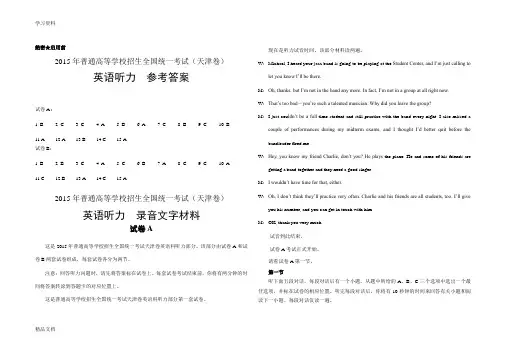
绝密★启用前2015年普通高等学校招生全国统一考试(天津卷)英语听力参考答案试卷A:1. B2. C3. C4. A5. B6. A7. C8. B9. C 10. B11.A 12.A 13.B 14.C 15.A试卷B:1. B2. B3. C4. A5. C6. B7. A8. C9. C 10. A11.C 12.B 13.A 14.C 15.A2015年普通高等学校招生全国统一考试(天津卷)英语听力录音文字材料试卷A这是2015年普通高等学校招生全国统一考试天津卷英语科听力部分。
该部分由试卷A和试卷B两套试卷组成,每套试卷各分为两节。
注意:回答听力问题时,请先将答案标在试卷上。
每套试卷考试结束前,你将有两分钟的时间将答案转涂到答题卡的对应位置上。
这是普通高等学校招生全国统一考试天津卷英语科听力部分第一套试卷。
现在是听力试音时间。
该部分材料读两遍。
W:M ichael, I heard your jazz band is going to be playing at the Student Center, and I’m just calling to let you know I’ll be there.M:Oh, thanks, but I’m not in the band any more. In fact, I’m not in a group at all right now.W:T hat’s too bad-you’re such a talented musician. Why did you leave the group?M:I just cou ldn’t be a full-time student and still practice with the band every night. I also missed a couple of performances during my midterm exams, and I thought I’d better quit before the bandleader fired me.W:H ey, you know my friend Charlie, don’t you? He plays the piano. He and some of his friends are getting a band together and they need a good singer.M:I wouldn’t have time for that, either.W:O h, I don’t think they’ll practice very often. Charlie and his friends are all students, too. I’ll give you his number, and you can get in touch with him.M:OK, thank you very much.试音到此结束。
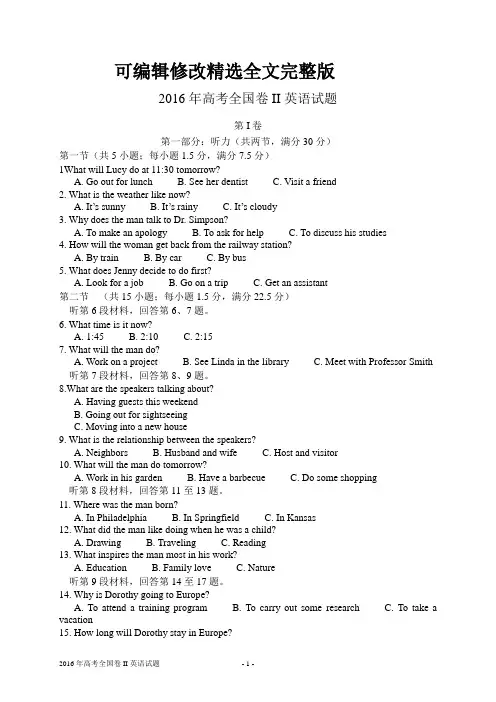
可编辑修改精选全文完整版2016年高考全国卷II英语试题第I卷第一部分:听力(共两节,满分30分)第一节(共5小题;每小题1.5分,满分7.5分)1What will Lucy do at 11:30 tomorrow?A. Go out for lunchB. See her dentistC. Visit a friend2. What is the weather like now?A. It’s sunnyB. It’s rainyC. It’s cloudy3. Why does the man talk to Dr. Simpson?A. To make an apologyB. To ask for helpC. To discuss his studies4. How will the woman get back from the railway station?A. By trainB. By carC. By bus5. What does Jenny decide to do first?A. Look for a jobB. Go on a tripC. Get an assistant第二节(共15小题;每小题1.5分,满分22.5分)听第6段材料,回答第6、7题。
6. What time is it now?A. 1:45B. 2:10C. 2:157. What will the man do?A. Work on a projectB. See Linda in the libraryC. Meet with Professor Smith 听第7段材料,回答第8、9题。
8.What are the speakers talking about?A. Having guests this weekendB. Going out for sightseeingC. Moving into a new house9. What is the relationship between the speakers?A. NeighborsB. Husband and wifeC. Host and visitor10. What will the man do tomorrow?A. Work in his gardenB. Have a barbecueC. Do some shopping听第8段材料,回答第11至13题。

2021年全国新课标二卷高考英语试题及答案(文字版)2021年全国新课标二卷高考英语试题本试卷共11页,共100分.考试时长90分钟.考生务必在答题卡指定区域作答,在试卷上作答无效.考试结束后,将本试卷和答题卡一并交回.第一部分听力(共两节,满分30分)做题时,先将答案标在试卷上。
录音内容结束后,你将有两分钟的时间将试卷上的答案转涂到答题卡上。
第一节(共5小题;每小题1.5分,满分7.5分)听下面5段对话。
每段对话后有一个小题,从题中所给的A、B、C三个选项中选出最佳选项。
听完每段对话后,你都有10秒钟的时间来回答有关小题和阅读下一小题。
每段对话仅读一遍。
例:How much is the shirt?A. £19.15.B. £9.18.C. £9.15.答案是C。
1. Why did the woman go to Mallorca?A. To teach Spanish.B. To look for a job.C. To see a friend.2. What does the man ask the woman to do?A. Take him to hospital.B. Go to a class with him.C. Submit a report for him.3. Who will look after the children?A. Jennifer.B. Suzy.C. Marie.4. What are the speakers going to do?A. Drive home.B. Go shoppingC. Eat out.5. What are the speakers talking about?A. How to fry fish.B. How to make coffee.C. How to remove a bad smell.第二节(共15小题;每小题1.5分,满分22.5分)听下面5段对话或独白。
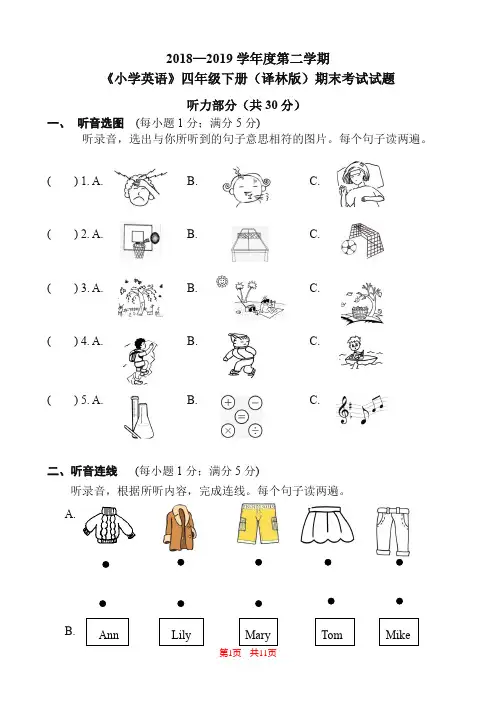
2018—2019学年度第二学期《小学英语》四年级下册(译林版)期末考试试题听力部分(共30分) 一、 听音选图 (每小题1分;满分5分)听录音,选出与你所听到的句子意思相符的图片。
每个句子读两遍。
( ) 1. A. B. C.( ) 2. A. B. C.( ) 3. A. B. C.( ) 4. A.B. C.( ) 5. A.B. C.二、听音连线 (每小题1分;满分5分)听录音,根据所听内容,完成连线。
每个句子读两遍。
A.B.三、听音判断(每小题1分;满分5分)听录音,判断所听句子与图意是否相符,相符的写“T”,不相符的写“F”。
每个句子读两遍。
1. 2. 3. 4. 5.( ) ( ) ( ) ( ) ( ) 四、听音应答(每小题1分;满分5分)听录音,选出最佳应答语。
每个句子读两遍。
( ) 1. A. Goodbye. B. Good night. C. See you.( ) 2. A. Have a look. B. That’s OK. C. Good idea.( ) 3. A. Thank you. B. Yes, please. C. Here you are.( ) 4. A. Me too. B. Fine. C. I don’t like English. ( ) 5. A. Yes, you can. B. I am Helen. C. This is Helen.五、听音选答(每小题1分;满分5分)听对话,选择正确的回答。
每段对话读两遍。
( ) 1. When do the girls have the match?A. At four.B. At four thirty.C. At five thirty.( ) 2. What day is it today?A. FridayB. Saturday.C. Sunday.( ) 3. How is Yang Ling?A. She is fine.B. She is not so good.C. She is cold.( ) 4. What lesson do they have in the afternoon?A. PE.B. Music.C. Science.( ) 5. Can Bobby draw a boat well?A. Yes, he can.B. No, he can’t.C. Sorry, I don’t know.六、听音填词(每空1分,满分5分)听录音,填入对话中所缺的单词。
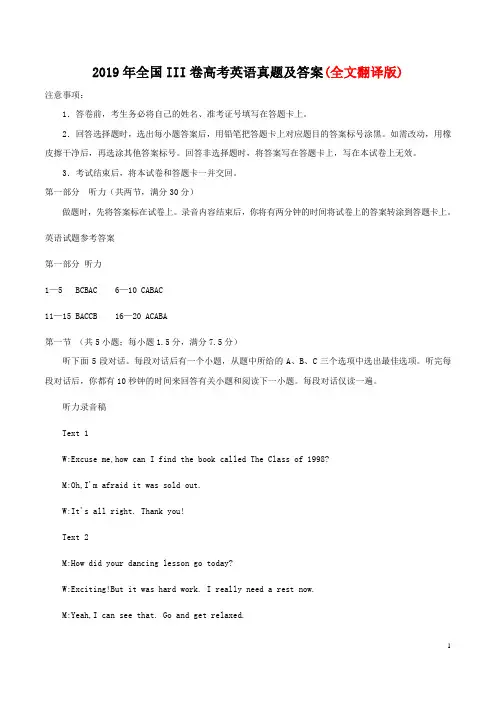
2019年全国III卷高考英语真题及答案(全文翻译版)注意事项:1.答卷前,考生务必将自己的姓名、准考证号填写在答题卡上。
2.回答选择题时,选出每小题答案后,用铅笔把答题卡上对应题目的答案标号涂黑。
如需改动,用橡皮擦干净后,再选涂其他答案标号。
回答非选择题时,将答案写在答题卡上,写在本试卷上无效。
3.考试结束后,将本试卷和答题卡一并交回。
第一部分听力(共两节,满分30分)做题时,先将答案标在试卷上。
录音内容结束后,你将有两分钟的时间将试卷上的答案转涂到答题卡上。
英语试题参考答案第一部分听力1—5 BCBAC 6—10 CABAC11—15 BACCB 16—20 ACABA第一节(共5小题;每小题1.5分,满分7.5分)听下面5段对话。
每段对话后有一个小题,从题中所给的A、B、C三个选项中选出最佳选项。
听完每段对话后,你都有10秒钟的时间来回答有关小题和阅读下一小题。
每段对话仅读一遍。
听力录音稿Text 1W:Excuse me,how can I find the book called The Class of 1998?M:Oh,I'm afraid it was sold out.W:It's all right. Thank you!Text 2M:How did your dancing lesson go today?W:Exciting!But it was hard work. I really need a rest now.M:Yeah,I can see that. Go and get relaxed.Text 3M:How much is that in total?W:$100. But if you have a membership card,I can give you a 20% discount. M:Great! This is my membership card.Text 4M:Jane,I'm going out for a while.W:But you have an appointment with Mr. Douglas at 3 o'clock.M:Well,please make it another day.Text 5W:David said he would quit his job at our school.M:Really? Why would he do that?W:His friend started a firm in London. She wanted David to help her.文字1劳:对不起,我怎么能找到《 1998年的班级》这本书?玛:哦,恐怕它已经卖完了。

剑桥雅思5Test3听力Section4答案+解析谈话场景:课堂发言介绍调研结果。
人物身份:讲话者为调研小组的学生代表。
谈话话题:介绍英国生活垃圾回收利用情况。
交际与语言表达1. 本文讨论如何实现垃圾回收利用,中间夹杂部分术语和专有名词,可能会对考生造成一定麻烦,这也再次提醒我们准备雅思考试时,尤其是学术类的,一定要尽可能地扩大自己的知识面与涉猎领域。
2. …by 2008 we must reduce our carbon dioxide emissions by 12. 5%, compared with 1990. 到 2008 年,与 1990 年相比,我们必须将二氧化碳排放量降低 12. 5%。
这句话有两点需要我们注意: 1)“( 某事物) 降低或增长多少”的表达方法是reduce or increase by…,请注意介词 by 的用法, by 表示度量、单位或标准; 2)“与……相比较而言”的表达方法是: compared with…可直接用在句首,用作状语。
3. …people don’ t think it’ s easy to recycle their waste. 人们认为回收利用他们的垃圾并不容易。
这句话实际上是“否定转移”,即句中的否定虽然出现在主句谓语动词部分,否定范围却不在主语谓语动词本身,而转移到句子的宾语、状语或其他成分上。
否定转移多用于表示思维活动,如判断看法之类的动词 believe, expect, hope, suppose, think 等。
如: I don’ t think that it’ s going to rain tomorrow. 我认为明天不会下雨。
4. One problem is that there aren’t enough“ drop- off” sites, that is, …问题是:并没有足够的垃圾投放点,也就是说……。
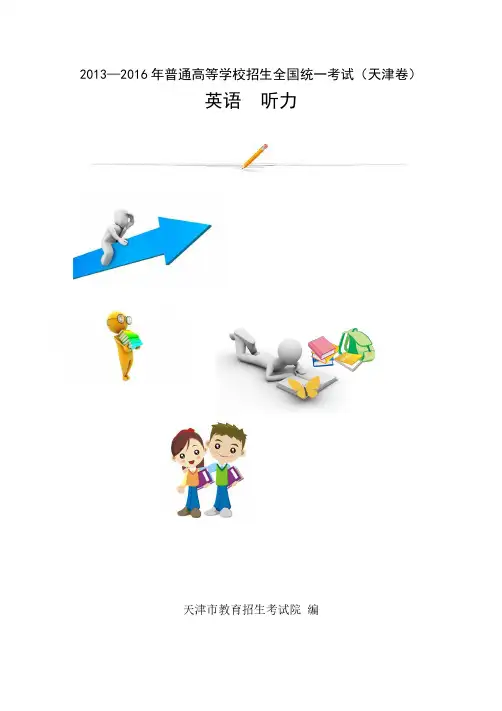
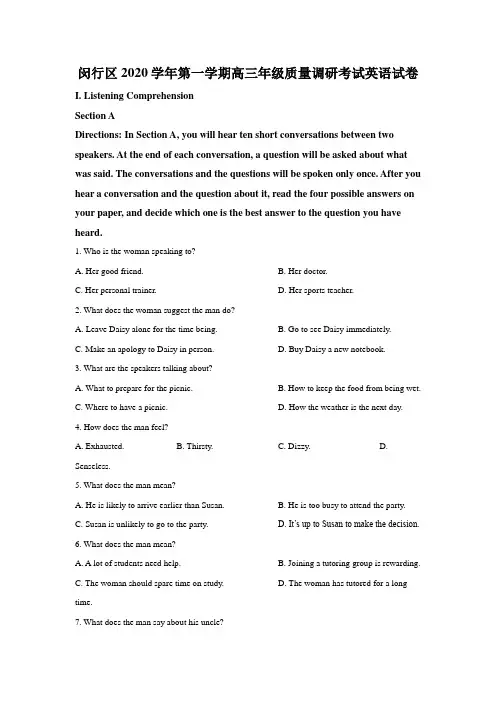

2008学年第一学期高一教学质量监测试题英语听力录音材料这是2008学年第一学期高一年级期末调研考试英语科听力部分。
该部分分为听力理解、听取信息两节。
注意,做题时,先在试卷上作答。
录音播完后,请在两分钟内将试卷上的答案转移到客观题答题卡上。
第一节听力理解听独白或对话听下面5段对话或独白。
每段对话或独白后有几个小题,从题中所给的A、B、C三个选项中选出最佳选项,并标在试卷的相应位置。
听每段对话或独白前,你将有时间阅读各小题,每小题5秒钟;听完后,各个小题将给出5秒钟的作答时间。
每段对话或独白读两遍。
听第1段对话,回答第1至第2两个小题。
现在,你有10秒钟的时间阅读这两个小题。
停顿00’10’’(停顿时间打点)(Text 1)W: Would you like to have something to drink?M: Yes. I’d love to have some beer.W: Do you like it with ice or without ice?M: Without ice. I don’t want to spoil the taste.W: Here you are.M: Thanks. Oh, it’s very good beer.W: I’m glad you like it. By the way, what’s your plan for the summer holiday?M. I’ve no idea. Maybe I’ll go surfing with Jack.W: How about going surfing together?M: That’s a good idea.停顿00’02’’重复停顿00’10’’(停顿时间打点)听第2段对话,回答第3至第5三个小题。
现在,你有15秒钟的时间阅读这三个小题。
停顿00’15’’(停顿时间打点)(Text 2)W: I can’t sleep very well. Could I have some sleeping pills?M: Hm, why can’t you sleep?W: I don’t know really.M: Is anything worrying you?W: Well…perhaps…I’m working very hard…We’re very busy at the moment.M: Well, I don’t really like giving patients sleeping pills. Forget all about your work, and you’llhave a good sleep. You must have a good rest…forget all about work. If you can’t sleep, havea hot bath before you go to bed, and then read a boring book. Don’t choose a book that’s veryexciting. Don’t drink coffee…W: Oh, but I like a drink before I go to bed.M: OK, have a glass of milk. Have some fruit or bread---but don’t have a big meal in the evening.停顿00’02’’重复停顿00’15’’(停顿时间打点)听第3段对话,回答第6至第8三个小题。
浙江省2021 年初中学业水平考试(丽水市)英语说明∶本卷共有三大题, 45 小题, 满分70 分.第一部分听力部分一、听力(共15 小题;满分25分)第一节:听小对话, 从A、B、C三个选项中选出正确的选项;回答问题。
(共5小题;每小题1分, 满分5分)1. What club does Mike want. to join?A. The music club.B. The football club.C. The art club.2. How is the weather now?A. Rainy.B. Cloudy.C. Sunny.3. What time did Rick get up this morning?A. At 6 :30.B. At 7 :00.C. At 8: 00.4. Where does the woman want to go?A. To a bank.B. To a flower shop.C. To a restaurant.5. What is the relationship between the two speakers?A. Doctor and patient.B. Husband and wife.C. Teacher and student.第二节∶听长对话, 从A、B、C三个选项中选出正确的选项, 回答问题。
(共5小题;每小题2分, 满分10分)听下面一段较长对话, 回答6、7 两个问题。
6. What color does the man's daughter like?A. Black.B. WhiteC. Yellow.7. How much does the man pay for the T-shirts?A. 20 dollars.B. 30 dollars.C. 32 dollars.听下面一段较长对话. 回答8~10 三个问题。
2016-2018三年高考英语全国I卷听力原文参考答案与解析2018年英语试题听力原文及参考答案参考答案BCCBA BABCC ABAAC BCBCA第一部分听力(共两节,满分30分)做题时,先将答案标在试卷上。
录音内容结束后,你将有两分钟的时间将试卷上的答案转涂到答题卡上。
第一节(共5小题;每小题1.5分,满分7.5分)听下面5段对话。
每段对话后有一个小题,从题中所给的A、B、C三个选项中选出最佳选项。
听完每段对话后,你都有10秒钟的时间来回答有关小题和阅读下一小题。
每段对话仅读一遍。
例:How much is the shirt?A.£19.15.B.£9.18.C.£9.15.答案是C。
1.what will James do tomorrow?A.Watch a TV program.B.Give a talk.C.Write a report.2.What can we say about the woman?A.She's generous.B.She's curious.C.She's helpful.3.When does the train leave?A.At6:30.B.At8:30.C.At10:30.4.How does the woman go to work?A.By car.B.On foot.C.By bike5.What is the probable relationship between the speakers?A.Classmates.B.Teacher and student.C.Doctor and patient.第二节(共15小题;每小题1.5分,满分22.5分)听下面5段对话或独白。
每段对话或独白后有几个小题,从题中所给的A、B、C三个选项中选出最佳选项。
听每段对话或独白前,你将有时间阅读各个小题,每小题5秒钟;听完后,各小题将给出5秒钟的作答时间。
2023年普通高等学校招生全国统一考试(全国乙卷)英语第一部分听力(共两节,满分30分)做题时,先将答案标在试卷上。
录音内容结束后,你将有两分钟的时间将试卷上的答案转涂到答题卡上。
第一节(共5小题:每小题1.5分,满分7.5分)每段对话仅读一遍。
1.Where does the conversation probably take place?A. In the book storeB. In the register officeC. In the dorm building2.What is the weather like now?A.SunnyB. CloudyC. Rainy3.What does the man want to do on the weekend?A.Do some gardeningB. Have a barbecueC. Go fishing4.What are the speakers talking about?A.A new officeB. A change of their jobsC. A former colleague5.What do we know about Andrew?A.He’s optimisticB. He’s activeC. He’s shy第二节(共15小题:每小题1.5分,满分22.5分)每段对话读两遍。
听第6段材料,回答第6,7题。
6.Which of the following does the woman dislike?A.The bedroomB. The sitting roomC. The kitchen7.What does the woman suggest they do next?A.Go to another agencyB. See some other flatsC. Visit the neighbours听第7段材料,回答第8,9题。
2024~2025学年度第一学期期中素质教育评估试卷九年级英语参考答案及听力材料第一部分听力理解I-III.1~5.CABBC6~10.BCCAA11~15.ABCCAIV.16.meet17.8/eight18.bus19.carefully20.report评分标准:1~20题每小题1分。
16~20题中的单词拼写错误可酌情扣分。
第二部分英语知识运用V.21~25.BCDAD26~30.BCDDA评分标准:21~30题每小题1分。
VI.31~35.DCABB36~40.CABDB41~45.AABCB46~50.ADCDB 评分标准:31~50题每小题1分。
第三部分阅读理解VII.51~55.BEFAC评分标准:51~55题每小题1分。
VIII.56~60.BCDDA61~65.CBDBC66~70.DCCDD71~72.CA73.Listen silently and then have a good talk with him.74.Because they care a lot about our health,study and so on.75.To be a good listener./Listening is important./It’s important for us to be a good listener.评分标准:56~75题每小题2分。
(73~75题意对即可。
)第四部分写IX.76.shape77.choice78.general79.decision80.creative评分标准:76~80题每小题1分。
X.Dear Mr White,I'm writing to express my interest in becoming a group leader for our new study groups.I believe I have what it takes to be a good leader.I am organized and have often helped my classmates with their schoolwork.I am always open to suggestions and ready to improve.I do well in my lessons,especially in planning and time management.As a group leader,I would make study plans that suit everyone's needs and provide supervision to make sure we all stay on tasks.I am confident that with my skills and abilities,I can make our study groups more productive and enjoyable.I sincerely hope that you will consider me for this position.Thank you for your time.Best regards,Li Hui英语试题听力部分录音文字稿I.短对话理解(共5小题;每小题1分,满分5分)你将听到五段对话,每段对话后有一个小题。
2018学年金山区九年级第一学期期末质量调研听力文字材料及参考答案Part I ListeningA. Listen and choose the right picture (根据你听到的内容,选出相应的图片)1. In order to save water, dripping taps should be fixed as soon as possible. (D)2. That amazing building is a hotel located in a deep valley near the city. (G)3. It is important for us to show our respect to the old by doing something good to them.(E)4. The man usually takes the underground on his journey to work.(F)5. This boy is practising English for the future modern life.(B)6. Team work is essential when having sports games .(A)B. Listen to the dialogue and choose the best answer to the question you hear (根据你听到的对话和问题,选出最恰当的答案)7. W: How are we going to the airport? I guess all the buses and the underground have stopped at this late time.M: Then why not call a taxi there?W: All right.Q: How will they go to the airport? (B)8. W: Are you going to see the film tonight?M: I'm thinking about it. But I’m afraid I can’t understand al l the words.W: Never mind. Listen more, and it will be better.Q: What is the boy worrying about? (D)9. W: Tom, you look so upset today. What’s wrong?M: It was my writing exam, too difficult for me to pass.Q: Why does Tom look unhappy? (C)10. W: Terrible weather, isn’t it?It has been raining for a couple of days. I wonder if it’ll be fine at the weekend.M: The good news is that the weatherman says it will be cloudy on Saturday, and sunny on Sunday.Q: What will the weather be like on Saturday? (A)11. W: Let me ask you some questions about the robbery. When was your bag robbed?M: When I was trying to get the money out for my books.W: Anything else robbed?M: Yes, some cards.Q: What job does the woman probably do? (B)12. W: Winter holidays are coming. Shall we go to visit Britain?M: Well, going to Britain takes many days, and I don’t think the holidays will be that long. I think we can go to Japan instead.Q: What are the two speakers talking about? (C)13. W: Do you do the housework at home, Tom?M: Doing housewor k? Don’t you think it’s the parents’ duty, Mary?W: Well, in my family, it’s the duty of all.Q: What does Mary mean? (B)14. W: I hope there will be a heavy snow this weekend so that we can play with snow.M: So do I, but I’ve just heard the weather forecast and it’s not good at all.W: What’s the matter? Is it going to rain?M: Worse than that. I t’s going to be sunny, so there won’t be any snow!Q: What can we learn from the dialogue? (A)C. Listen to the passage and tell whether the following statements are true or false (判断下列句子是否符合你听到的短文内容, 符合的用“T”表示,不符合的用“F”表示)One day in December, a man from Italy called Mario, was going home in his car. He stopped at a big store to buy some Christmas presents for his family. While he was there, he also went to the supermarket. He bought some nice food for supper. He came out of the shop and put the presents and food in the back of his car. Then he went to visit a friend who lived round the corner. He wished him Merry Christmas. He stayed with his friend for about an hour. It started getting dark so he decided to go home.As he was driving home, he got a flat tyre. He was not very good at changing tyres. Luckily, another man stopped and offered to change the tyre. Mario was pleased that someone helped him! The man told Mario to get in the car because it was raining a lot. He said he would change the tyre for him. The man, who seemed really friendly and helpful took the flat tyre off. Then he put the good tyre on. Mario thanked the man. The man said goodbye and got in his car and left. When Mario arrived home, he went to get the presents. That was when he discovered the man was a thief. Everything including the old tyre, the Christmas presents and the food were not there except a ticket. Mario didn’t collect the prize money with the ticket. He put an advertisement in the newspaper, asking the thief to come and get the ticket. The thief went to see Mario and got theticket back. Then he went to collect the prize money. Why did Mario return the ticket to the thief? “Well”, he said, "He might be a thief but I am not.”15. T 16. T 17. F 18. F 19. T 20. FD. Listen to the passage and complete the table (听短文,完成下列内容。
每空格限填一词) Harry Kane is a striker for London football club and the England national team. He scores lots of goals and the fans love him.Q: Harry, nice to meet you. Who affected your idea when you were growing up?Harry: David Beckham was at my school ten years before me. He was our local hero.Q: You started your football at Arsenal.Harry:Yes, when I was eight years old, I spent a year there. They didn't think I was good enough, so they let me go.Q: It took a few years to get into the first team.Harry: Yes. Things didn't always go well, but I worked really hard, and then I got a chance in the first team.Q: And now you're the fans' favourite.Harry: The fans make a big difference. You need their support. It gives you strength if you're trying to score.Q: Then you were picked for the England team. You were 21, and you were on the bench for a match at Wembley. You made your first show there.Harry: It was amazing. It was at Wembley that I ran out onto the playground.Q: And how long did it take you to score your first goal for England?Harry: I think it was 80 seconds.Q: The fans were singing, "He scores when he wants!" And that's true. You've won the Golden Boot twice for the most goals scored in the Premier League! What gives you so much confidence?Harry:Hard work. Hours of practice. And belief. If you don't believe in yourself, not many others will.Q: Thank you very much, Harry.Harry: You are welcome.21. affected idea/was hero 22. was eight/8 23. ran out 24. for England 25. Hard workPart 1I. A. 1. D 2. G 3. E 4. F 5. B 6. AB. 7. B 8. D 9. C 10. A 11. B 12. C 13. B 14. AC. 15. T 16. T 17. F 18. F 19. T 20. FD. 21. affected idea/was hero 22. was eight/8 23. ran out 24. for England 25. Hard workPart 2II. 26. C 27. B 28. A 29. B 30. D 31. D 32. A 33. B 34. A 35. D36. D 37. B 38. C 39. A 40. B 41. C 42. D 43. B 44. D 45. AIII. 46. C 47. A 48. E 49. B 50. B 51. D 52. E 53. CIV. 54. first 55. enables 56. speech 57. recently 58. women 59. serious60. happiness 61. changeableV. 62. Are...building 63. What does 64. to do 65. care for/about 66. were invited 67. if/whether I 68. The little boy is clever enough to work out the maths problem.Part 3VI. A. 69. B 70. D 71. A 72. C 73. A 74. DB. 75. D 76. A 77. B 78. C 79. A 80. DC. 81. without 82. prize 83. no 84. described 85. train 86. keep 87. frightenedD. 88. Wassily Kandinsky. (did./did it./developed a way of painting called abstract art.)89. Yes, he did .90. I would choose (the colour) blue. /Blue.91. Because they/different colours can have an effect on the success (of these) with the readers.92. By using blues and purples.93. I agree/also think that red means love, because when we give others presents, we oftenuse red packets.(Any reasonable answer is acceptable.)VII. 94.8+8+4=20。